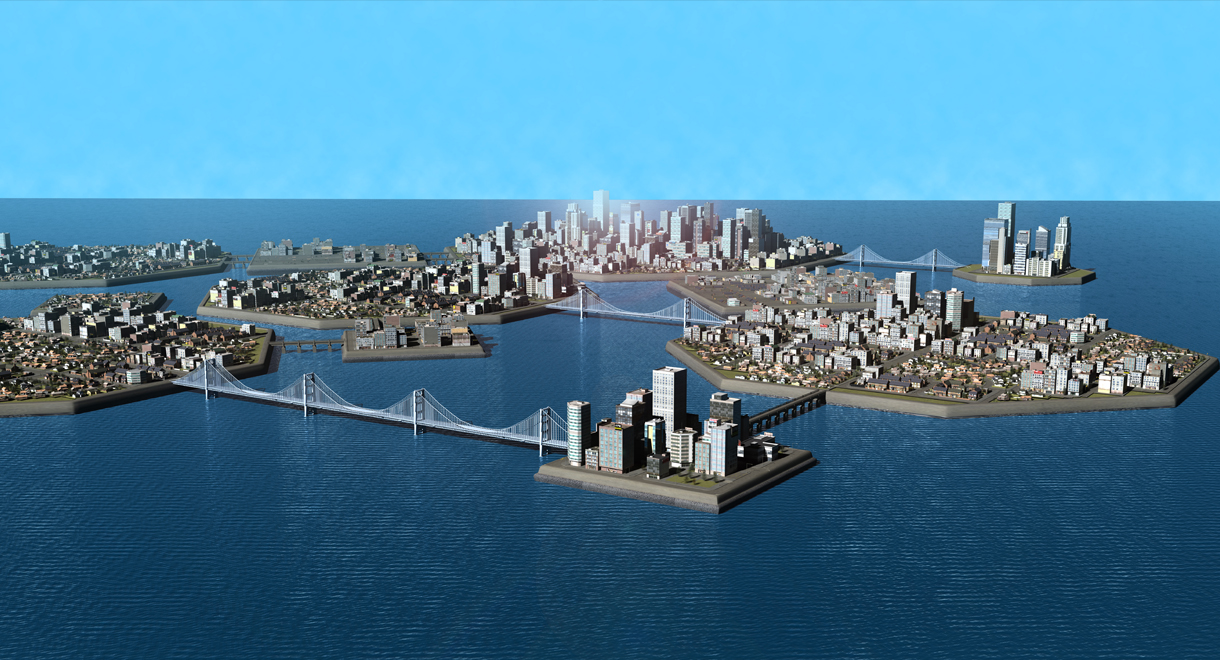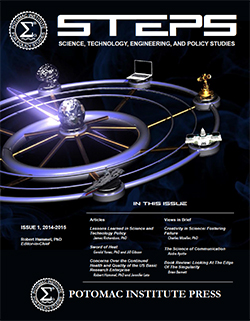Water on the Rise: Policies for Coastal Plains

A potential sea level rise in coastal areas such as Miami, Norfolk, and New York City threatens the population’s economic and social status quo. Engineers, policymakers, and emergency managers, are encouraged to rethink their approach to mitigating the risk from hurricanes, storm surge, and the potential of elevated sea levels. The state of Louisiana, in general, is one of the regional economic hubs for energy production, infrastructure distribution and international and domestic trade; nevertheless, the loss of land over time due to sea level rise and hurricanes is threatening infrastructure in this coastal area.
Engineers can use the environment and technology to adapt to changes in the environment. The author promotes the idea to build floating cities, which would use solar energy to produce electricity and recyclable seawater to produce freshwater. Funding for such projects would come from public-private partnerships utilizing limited recourse or non-recourse financing. Investing in a floating city concept would save the money that would have been invested in levee systems upgrades, protecting the city from flooding, and creating larger ports that encompass greater services to assist with the distribution system. Therefore, implementation of the floating city project can put the coastal people and the infrastructure out of danger, and hence, ensure social and economic stability.
Space to Breathe: The Argument for a New Outer Space Treaty

Since the beginning of the space race, military space policy has been pursued in an environment with little international consensus. The force-enhancement capabilities provided by military space assets have been tied into the overall deterrence structure of the US, and because of this, American policymakers have resisted international efforts to regulate military actions in space. Given growing complexities in the space environment, however, and an increase in the number of space-faring nations, it would be wise for the US to reconsider its approach to space policy. The pursuit of a new international space treaty, along with changes to American space policy, could create needed stability, protect space infrastructure, and strengthen US deterrence capabilities.
Read more: Space to Breathe: The Argument for a New Outer Space Treaty
Creativity in Science: Fostering Failure

Many of the world’s greatest accomplishments that can be attributed to science are a consequence of failure.1 Specifically, they are the result of perseverance from failure. The best scientific minds are unfazed by failure because it is the fuel that drives their pursuits of knowledge forward. Failure breeds innovation and innovation is driven by creativity. Revolutionary science requires creativity and thus requires failure. The scientific community, those who produce and fund our science, is becoming increasingly fearful of failure. Our scientists fear that producing lackluster results will mean they will lose their jobs. Our funding institutions fear that investing in endeavors that do not produce immediate gains for society (or their investors) will result in decreases in their future budgets or cancellation of their programs. A culture change within the scientific community is needed as we continue to move into the 21st Century that will embrace failure and learn how to manage this failure into future success. Doing this will create new incentives for scientists to demonstrate their creativity, help us manage our risks better in scientific funding, and lead to a surge innovative solutions to the 21st Century’s most complex scientific problems.
Science of Communication

Science communication is a critical, yet underdeveloped field that encompasses scientists, policymakers and the public. With the goal of providing a general and accurate understanding of scientific investigation and implications of scientific outcomes, it serves as a foundation for evidence-based decisions regarding issues that impact everyday life. Moreover, science communication has importance in influencing governmental decision-making with regard to science regulation, policy, and funding. Despite its importance, science communication has experienced deficiencies and failures which have often been blamed on scientists, media, or the public.
Science communication can broadly be defined as the “...use of appropriate skills, media, activities, and dialogue to produce one or more of the following responses to science: awareness, enjoyment, interest, opinion forming, and understanding.”1 Scholars have emphasized the essential and vital role of science communication among all fields of scientific debate, research, and advancement. Ideally, science communication should relay scientific information clearly and accurately, utilizing the most current, reliable, quality sources.2 Good science communication is essential in today’s society as it guides public understanding, evaluation, and ultimately, behavior in various areas of social life – ranging from environmental awareness to grocery purchases to medical decisions.
Book Review: The Singularity Series by William Hertling

Looking at the Edge of the Singularity
The Singularity Series, by William Hertling, expertly crafts a world where an email optimization program and a simple computer virus, organized into systems that do not exceed our current day technology capabilities, set the world ablaze (figuratively and literally). The series centers on concepts and issues in artificial intelligence that we may not think we need to discuss or evaluate yet, but as the series reveals, they could be much closer than they appear. New computing technologies that express sentience and intelligence will have positive and negative impacts on how we govern, structure our economy, solve global problems, and realize our full potential as a species. One of the intended takeaways from The Singularity Series is the progression of jaw-dropping, world-changing events that arise from the smallest of near-future, low-impact catalysts. The book series places a focus on the impacts of the genesis and subsequent social integration of non-human intelligent agents.
Read more: Book Review: The Singularity Series by William Hertling


